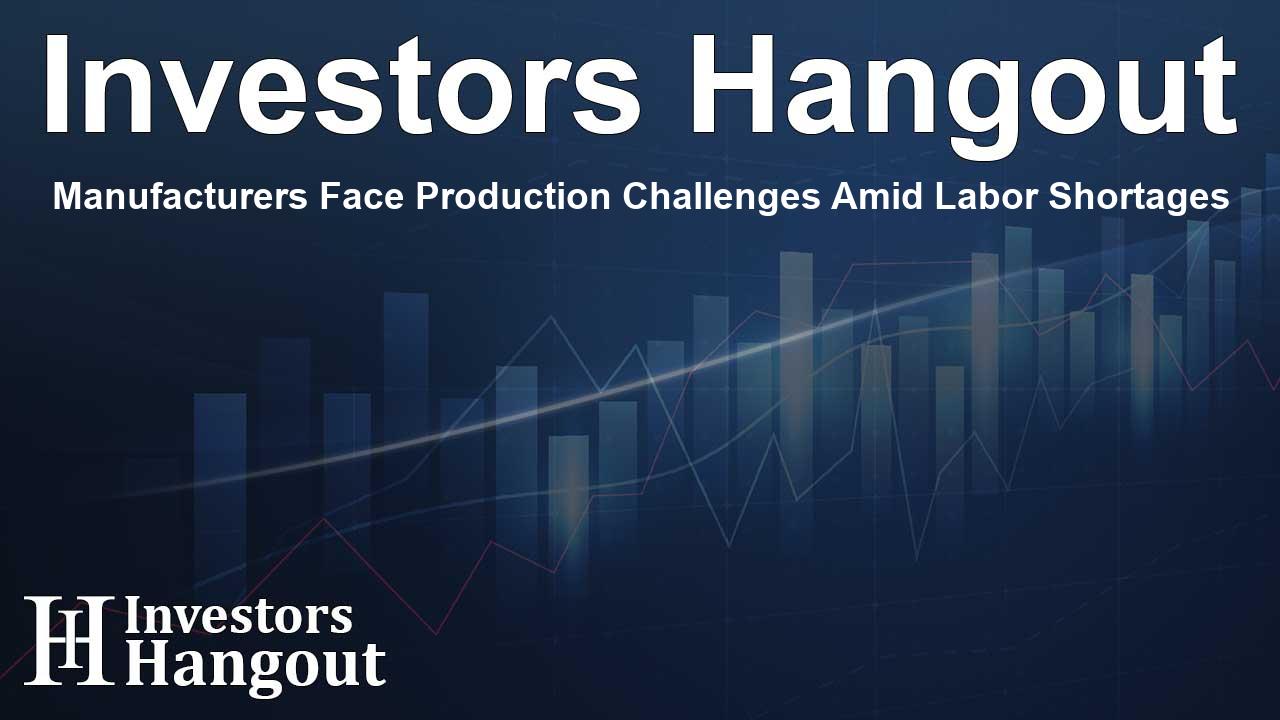Manufacturers Face Production Challenges Amid Labor Shortages

Impacts of Labor Shortages on Manufacturing
Manufacturers are currently navigating significant challenges due to labor shortages, with recent studies showing that a staggering 90% of them are feeling the adverse effects on production capacity. As the demand for goods continues to rise, the manufacturing sector faces dual pressures: a dwindling workforce and high employee turnover. Many manufacturers realize the critical role technology can play in countering these challenges, yet only a lesser percentage are actually implementing such solutions.
Understanding the Current Manufacturing Landscape
The findings of a recent Quickbase report shed light on these issues. It discusses the ongoing struggle within the manufacturing sector to retain skilled workers and manage turnover rates. With that said, nearly half of the manufacturers surveyed have acknowledged they plan to incorporate technology such as automation to help alleviate the crisis. However, implementation remains lacking, with only a fraction currently utilizing these technologies. This gap creates not only delays in production but also heightens stress levels among existing staff members, risking both productivity and morale.
Labor Shortages and Employee Morale
The labor shortage is more than just a statistic; it becomes a very real challenge on the production floor. According to the report, 89% of respondents indicated that their manufacturing efficiency suffers due to a lack of available workers. Moreover, an aging workforce is contributing to a growing skills gap. The challenge of ‘brain drain’—where vital knowledge fails to be passed from experienced workers to new hires—has made matters worse. A significant number of manufacturers have reported that they are raising wages to attract talented workers, while others resort to hiring less experienced personnel and providing them with on-the-job training, which can lead to long-term sustainability challenges.
The Role of Technology in Overcoming Challenges
Adopting technology and automation is essential for manufacturers looking to stabilize their operations amidst such challenges. The urgency behind technological transformation becomes strikingly evident when considering Deloitte’s projection that 1.9 million manufacturing jobs will remain unfilled in the next decade. Therefore, prioritizing talent development, knowledge retention, and employee engagement cannot be overemphasized.
Key Areas for Technological Impact
To harness the positives of technology, manufacturers can focus on several key areas:
- Enhancing production efficiency through real-time analytics and IoT sensors, which can significantly improve process workflows.
- Automating quality management processes to uphold production standards and reduce the risk of errors.
- Leveraging predictive analytics for machine maintenance, which can reduce unscheduled downtimes that are costly in nature.
- Improving workplace safety by utilizing advanced tools to minimize risks, foster a culture of safety, and ensure adherence to compliance and safety standards.
A Call to Action for Manufacturers
Josh Cranfill, GM Manufacturing for Quickbase, emphasizes that the issues of labor shortages and the skills gap are longstanding issues for the sector. What has changed is the urgency these problems have created, prompting manufacturers to increasingly turn towards technology and automation as solutions. By doing so, companies can significantly enhance training, transparency in operations, efficiency, and safety. This moment presents a unique opportunity for manufacturers to innovate and evolve, addressing both current challenges and future workforce needs.
About Quickbase
Quickbase is a leading Work Management platform used by organizations around the world to improve productivity on large-scale projects and operations. The platform integrates the power of AI and low-code/no-code solutions to streamline processes, foster collaboration, and enhance overall operational efficiency while reducing administrative burdens. Headquartered in Boston, Quickbase has a global presence with teams in various countries. They are committed to empowering industries like manufacturing and construction in balancing operational efficiency with safety considerations.
Frequently Asked Questions
What percentage of manufacturers are affected by labor shortages?
According to the report, 90% of manufacturers report negative impacts on production due to labor shortages.
What solutions are manufacturers considering for labor shortages?
Many manufacturers plan to utilize technology and automation, with 49% indicating future plans, though only 39% are currently implementing such solutions.
How does the aging workforce affect manufacturing?
An aging workforce leads to a skills gap, creating difficulties in knowledge transfer and operational efficiency.
What impact is technology projected to have on manufacturing job vacancies?
Deloitte estimates that 1.9 million manufacturing jobs could remain unfilled over the next decade, emphasizing the importance of technology adoption.
How does Quickbase support the manufacturing sector?
Quickbase provides a Work Management platform that integrates processes and improves productivity, helping manufacturing businesses manage large-scale projects and enhance operational efficiency.
About Investors Hangout
Investors Hangout is a leading online stock forum for financial discussion and learning, offering a wide range of free tools and resources. It draws in traders of all levels, who exchange market knowledge, investigate trading tactics, and keep an eye on industry developments in real time. Featuring financial articles, stock message boards, quotes, charts, company profiles, and live news updates. Through cooperative learning and a wealth of informational resources, it helps users from novices creating their first portfolios to experts honing their techniques. Join Investors Hangout today: https://investorshangout.com/
Disclaimer: The content of this article is solely for general informational purposes only; it does not represent legal, financial, or investment advice. Investors Hangout does not offer financial advice; the author is not a licensed financial advisor. Consult a qualified advisor before making any financial or investment decisions based on this article. The author's interpretation of publicly available data shapes the opinions presented here; as a result, they should not be taken as advice to purchase, sell, or hold any securities mentioned or any other investments. The author does not guarantee the accuracy, completeness, or timeliness of any material, providing it "as is." Information and market conditions may change; past performance is not indicative of future outcomes. If any of the material offered here is inaccurate, please contact us for corrections.